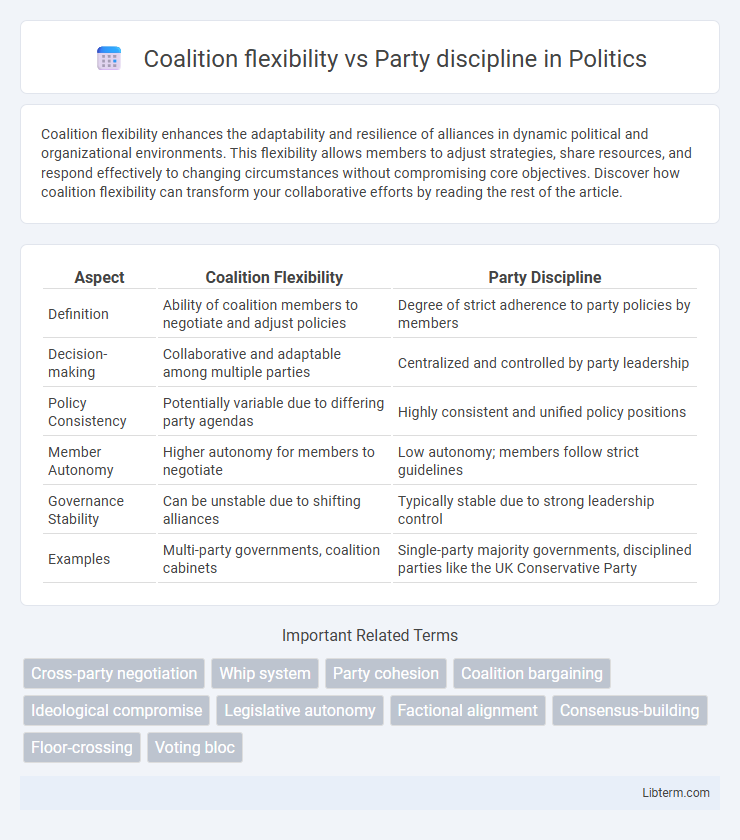Coalition flexibility enhances the adaptability and resilience of alliances in dynamic political and organizational environments. This flexibility allows members to adjust strategies, share resources, and respond effectively to changing circumstances without compromising core objectives. Discover how coalition flexibility can transform your collaborative efforts by reading the rest of the article.
Table of Comparison
| Aspect | Coalition Flexibility | Party Discipline |
|---|---|---|
| Definition | Ability of coalition members to negotiate and adjust policies | Degree of strict adherence to party policies by members |
| Decision-making | Collaborative and adaptable among multiple parties | Centralized and controlled by party leadership |
| Policy Consistency | Potentially variable due to differing party agendas | Highly consistent and unified policy positions |
| Member Autonomy | Higher autonomy for members to negotiate | Low autonomy; members follow strict guidelines |
| Governance Stability | Can be unstable due to shifting alliances | Typically stable due to strong leadership control |
| Examples | Multi-party governments, coalition cabinets | Single-party majority governments, disciplined parties like the UK Conservative Party |
Understanding Coalition Flexibility
Coalition flexibility refers to the ability of political alliances to adapt policy positions and coordinate strategies in response to evolving political landscapes and diverse member interests. This adaptability enhances government stability by allowing parties to negotiate compromises without strict adherence to party discipline, fostering consensus and reducing legislative gridlock. Understanding coalition flexibility involves analyzing mechanisms such as shared agendas, informal agreements, and rotational leadership that accommodate varying priorities while maintaining collective cohesion.
Defining Party Discipline in Parliamentary Systems
In parliamentary systems, party discipline refers to the expectation that members of a political party vote and act in alignment with the party's official policies and leadership decisions. Strong party discipline ensures cohesive policy implementation and stability within coalition governments by minimizing dissent among legislators. Conversely, high flexibility within coalitions allows individual parties to negotiate policy priorities, often leading to compromises that balance collective governance with party autonomy.
Historical Context: Coalitions and Party Cohesion
Coalition flexibility has historically allowed governments to accommodate diverse interests, enhancing stability in multiparty systems where strict party discipline might fracture coalitions. In contrast, strong party discipline has often ensured unified policy implementation and coherent legislative agendas, particularly in parliamentary systems with dominant parties. The balance between coalition adaptability and party cohesion reflects the evolving needs of political environments, where historical cases demonstrate shifts from rigid party control to negotiated compromise within coalitions.
Adaptability in Coalition Governments
Coalition flexibility enhances adaptability in coalition governments by allowing parties to negotiate policy changes and respond to shifting political landscapes without rigid constraints. This dynamic approach fosters compromise and innovation, enabling governments to manage diverse interests and maintain stability. Strong party discipline may limit this adaptability, as it enforces strict adherence to party lines, reducing the coalition's ability to adjust strategies effectively.
The Role of Party Discipline in Legislative Success
Party discipline plays a critical role in legislative success by ensuring cohesion and predictability within political parties, which facilitates the passage of bills and the implementation of party agendas. Strong party discipline minimizes internal dissent and fosters unified voting blocs, enabling coalition governments to maintain stability despite diverse interests. Legislators bound by party discipline are more likely to support leadership initiatives, balancing coalition flexibility with the need for effective governance in parliamentary democracies.
Trade-offs: Flexibility versus Unity
Coalition flexibility allows diverse parties to negotiate policy positions, fostering adaptability and broader representation, but may dilute overall unity and coherence in decision-making. Party discipline enforces strict adherence to party lines, enhancing cohesion and streamlined legislative action, yet risks suppressing individual members' perspectives and reducing responsiveness to shifting public opinions. Balancing flexibility against discipline involves trade-offs between accommodating diverse interests and maintaining a unified front essential for effective governance.
Impact on Policy Making and Governance
Coalition flexibility allows for a broader range of policy compromises, facilitating adaptive governance in multiparty systems. In contrast, strong party discipline ensures coherent policy agendas but may limit individual lawmakers' input, affecting the diversity of legislative outcomes. The balance between flexibility and discipline directly influences policy responsiveness and the stability of government decision-making processes.
Case Studies: Flexible Coalitions vs. Strict Party Lines
Flexible coalitions in parliamentary systems often promote policy innovation and compromise, as demonstrated by the German Bundestag where coalition agreements allow diverse parties to collaborate without strict adherence to party discipline. In contrast, the British Parliament exemplifies strict party lines, with the Conservative and Labour parties enforcing rigorous voting discipline to maintain cohesive policy positions and legislative efficiency. Case studies reveal that flexible coalitions encourage consensus-building at the expense of potential government instability, while strict party discipline ensures unified policy agendas but may stifle internal debate and adaptability.
Challenges in Balancing Coalition Flexibility and Discipline
Balancing coalition flexibility and party discipline presents challenges such as maintaining unified policy agendas while accommodating diverse member interests. Excessive flexibility can lead to fragmented decision-making, weakening collective accountability and legislative effectiveness. Conversely, strict party discipline may suppress individual representation and alienate coalition partners, risking instability and fragmentation.
Future Trends in Political Collaboration
Coalition flexibility allows political parties to adapt policy positions and form issue-based alliances, enhancing responsiveness to evolving voter demands. Party discipline enforces cohesion but risks alienating diverse party members, potentially stifling innovation in policymaking. Future political collaboration trends emphasize hybrid models that balance strategic flexibility with sufficient discipline to maintain stable governance and effective legislative productivity.
Coalition flexibility Infographic

 libterm.com
libterm.com